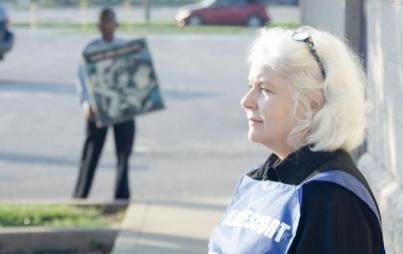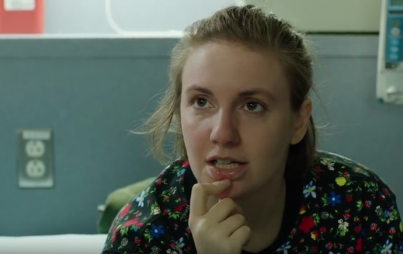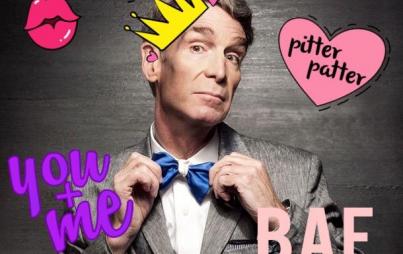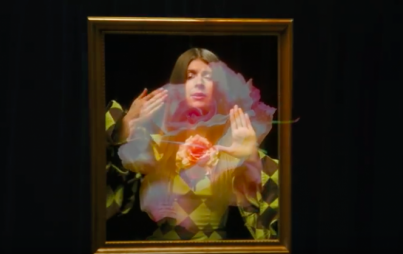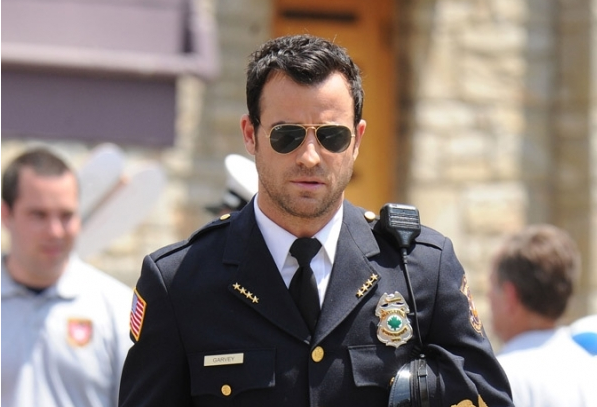
Last night I may have watched the worst television program I've ever seen; if I had to kiss an old rat to get that hour back of my life I would pucker the fuck up, but because I can't, I'm going to have to settle for a digital rant.
While I'm no T.V. head (I don't own one and use my parents' HBOGO subscription to glean the crack when I need it), I'm no stranger to the joys of the flickering box. There was even a time when I looked forward to watching Rock of Love every Sunday night, so I've sullied my mind and free-time with the best of them.
Last night I was over at my pal Melissa's and she was all excited about the pilot for the Leftovers. The show boasts a powerful media pedigree, beginning with its adaptation from a novel written by Tom Perrotta coupled with showrunner Damon Lindelof, who worked on Lost. Oh, and the first two episodes were directed by Peter Berg of Friday Night Lights, who's no stranger to small-town misery.
I had already told her I felt at best lukewarm; the posters were all over the NYC subway, (like the one below)

Let's start with the opening scene—which should have been the most terrifying thing on the goddamn planet (2% of the world's population simply vanishes!)—and instead, felt like the wet hiss of a miserable whistling kettle. Urgent, yes, but mostly because it you think you hear that woman scream for her vaporized baby one more time—sam! Sam! SAAAAAM!—you're going to break a window.
We soon meet the too-good-looking local sheriff, played by the painfully brooding Justin Theroux. His golden-hearted son seems to be a errand boy for a mysterious black mystique (the only person with some acting chops on the whole damn show). His daughter, Jill (played by the pretty if petulant Margaret Qualley) is a neo-Angela Chase (from My So-Called Life), all red pouting lips, plaid shirts and high school angst, without any of the charm or actual awkwardness that accompanies adolescence.
She and her father seem to be suffering over the loss of their wife/mother, and the tautness of their sorrow is explored—where else?—at the dinner table. Oh, and yes, Jill even has an "edgier" best friend—complete with a fringed halter top and ombred hair, a parred down, not-so-wise or compelling knock-off of Angela's free-spirited pal Rayanne Graff.
Moving on.
The two girls head to one of those, "everybody's invited!" high school parties where the viewers are supposed to be disturbed at the drug use and promiscuity—which includes a depraved game of "spin the iPhone" complete with commands like "fuck" and "choke." I'm not kidding. Our oh-so-detached Jill heads into a bedroom to choke a friend of hers while he masturbates beside her. And like a bad PSA, one single tear slides down her face as he ejaculates. Melissa and I turned to each other. "Wow. Did you ever attend a party like that in high school?" And we burst out laughing.
Then there's the whole cult thing happening in town, the "Guilty Remnants" or GRs. It's still more-than-nebulous, but it seems that in the wake of everyone disappearing, a particularly disturbed group of individuals decided to band together, dress in all white, take a vow of silence and chain-smoke. No, really. Like in every scene the entire silent cult is chain-smoking. And of course, we discover that Jill's mother didn't disappear . . . she joined the cult! The obligatory "reveal" scene is the sheriff quaffing too many beers before screaming her name outside the lawn of the cult's house. "Come home!" he begs. "No . . ." She stares. It's "riveting" stuff.
Then there's 'ol sexy puffer-lips Liv Tyler (the shell-shocked Meg Abbott), who's patented breathy lisp just isn't as sexy as 36. She sounds stunted or maybe a little drunk. Empire Records was her high point as far as I'm concerned.
And in the backdrop of all of this, there is a pending parade—Heroes Day—in which the town will honor those who have disappeared. The sheriff is convinced all hell is going to break loose and tries to convince the mayor—played by Amanda Warren—in an overly banter-y exchange to "call it off." (Oh. And this mayor seems to be one of two black women in the entire town. I'm sorry but one African-American woman in a pink power-suit does not diversity make.) And guys, you won't believe it but Heroes Day doesn't go well—in fact it devolves into a riot between the cult and the townsfolk. Can you believe it?! I mean, the foreshadowing was just so subtle.
Did we mention then there are also violent, jarring flashbacks including one with Sheriff Garvey in a bar? A woman asks, "So where were you when it happened?" (Which I suppose is some like clever nod to JFK's assassination or 9/11?) The camera flashes into Garvey's bedroom where he's sweatily pile-driving someone (hopefully his wife?). The camera flashes back and he mutters, "Oh, I was cleaning out a gutter." If that's not some latent women-hatin' shit, I don't know what is.
Between the abysmal (over)acting, the alternatively piano-laden/distorted guitar soundtrack, and the I'd-never-believe-this dialogue . . . there's no brilliant sci-fi plot on earth that could resurrect this painfully god-awful project.
But, Wait! The Critics Like It!
I headed to the ol interwebs this morning to see what my fellow writers had to say about the show, anticipating a delectable tear-down and criticisms I could chew on for hours. But alas (and shockingly), this was not the case.
The Washington Post believes:
The Leftovers...is a profoundly moral show, one in which doing right is valuable, but where the path to goodness is full of great pain and confusion...In the absence of an end goal, the show does not fetishize manipulation or amorality.
Who the hell cares whether it's about cannibals having incestuous relationships with their mothers or the programming is about Mother Theresa and chicken soup for your goddamn soul? A show is either interesting to watch or it isn't. A refreshingly un-debauched moral system (which I'm not even sure is true about this show) doesn't mean it's worthy of our time. I'm sorry the WP feels that most programming "fetishizes amorality" and is perhaps participating in the the deterioration of our social fabric, but The Leftovers sure as hell isn't going to help us reweave it.
Meanwhile over at The Daily Beast, their writer is salivating over the "realism" of The Leftovers, reminding us how a Rapture-like scenario could render our modern society:
Perrotta's apocalypse isn't global; it's personal. The planet's usual routine has resumed. There are no zombies to contend with. No cyborgs. No hollowed-out metropolises. No charismatic antiheroes, even. Just millions and millions of people, all dealing with their own individual end times. Thanks to Lindelof and his sensitive, subtle cast, we get to know a handful of them, and through them, we get to imagine how we might fare if their shock were our own. Brenneman is especially affecting as the mute but conflicted Laurie; she transforms what could have come off as a cold, writerly conceit into a believable, even identifiable, human being.
Yes, the small-town as metaphor for society thing can be a fantastic framework for writing—think of The Grapes of Wrath, Lord of the Flies or Twin Peaks. Toggling between the dramatic minutia of a soap opera and the bird's eye view of universal evils, these works successfully explore an individual's "end of times." Do I think The Leftover's fictional town of Mapletown could have followed in these stories' footsteps and furthered an already successful narrative archetype? Sure. Does it? Not by a long shot.
Even the typically scathing A.V. Club is drinking the Kool-Aid:
The reason it works—or the reason I think it could work—is that The Leftovers is playing with a certain kind of metaphor for life. The unexplained happens all the time. There are things that stretch our understanding, occurrences that stymie science and deny proof of God, and most of us are so used to dealing with them all the time we’ve forgotten about them, or swept them under the rug. Why do we exist? What happens to us when we die? Why are we the way we are? Survival asks too much of us to sit and ponder the big questions on a regular basis, and yet these unknowns are at the center of our whole lives.
Everyone seems to be fixated on the conceptual underpinnings of the show, which by definition are pretty fascinating. Who hasn't laid in bed, heart racing with a sense of miserable vertigo that we're all just hurtling toward the void? Millions of people suddenly vanishing elicits all kinds of existential questions . . . but simply reading the plot-line three weeks ago already piqued and satiated my interest. There's nothing the writers wrote, the actors acted, or the plot revealed that furthered my life-long quandaries. It's not enough to say a show is wrestling with the notion of God; it actually has to wrestle with it.
Honestly, I feel like the whole damn world has gone mad, and I can only hope that as the weeks pass—like with a new lover you foolishly think is The One—this show will be seen as the dumb, overly-dramatic charlatan it is. Is today's television so sub-par that this is what we're happy to watch? Is science fiction considered so low-brow we're happy to dump a bunch of "fucks" and clunky social commentary all over it and call it art?
I'd like to get the writers, show-runners and creative team at HBO and put them all over my knee for a swift spanking.
I guarantee it'd get better ratings.
Main photo courtesy of FameFlynet Pictures

![By si.robi (Williams S. WM16 (20)) [CC BY-SA 2.0 (https://creativecommons.org/licenses/by-sa/2.0)], via Wikimedia Commons By si.robi (Williams S. WM16 (20)) [CC BY-SA 2.0 (https://creativecommons.org/licenses/by-sa/2.0)], via Wikimedia Commons](/sites/default/files/styles/profile/public/images/article/2019-06/Serena%2520.png?itok=5YupgjTS)
